
It was a short, but busy week on Capitol Hill as lawmakers returned from observing the President’s Day holiday to act on a wide variety of bills. This includes legislation strengthening Tennessee’s laws against the “worst of the worst” child sex offenders. Under current law, sex offenders can be charged with aggravated rape of a child if their victim is zero to three years old. Senate Bill 1800 raises that age range to zero to eight years old.
Under legislation passed by the General Assembly last year, aggravated rape of a child is a Class A felony offense which is automatically punishable by life imprisonment without the possibility of parole. This bill offers one more tool to combat these horrific crimes.
In other action, Senate Judiciary Committee members voted to clarify a law passed last year prohibiting sexual offenders or violent sexual offenders from staying overnight at a residence in which a minor resides or is present. A lawsuit was filed after passage of the legislation pertaining to parents and children who fall under provisions of the new law. Senate Bill 1568 addresses the matter by authorizing a District Attorney (DA) to petition a circuit court when they believe an offender whose victim was age 12 or under poses risk of substantial harm to his or her child. The court would then make a finding by clear and convincing evidence regarding prohibition of overnight visits. The legislation seeks to address the legal questions that have arisen, while still providing an avenue to protect children when there is a substantial risk of harm.
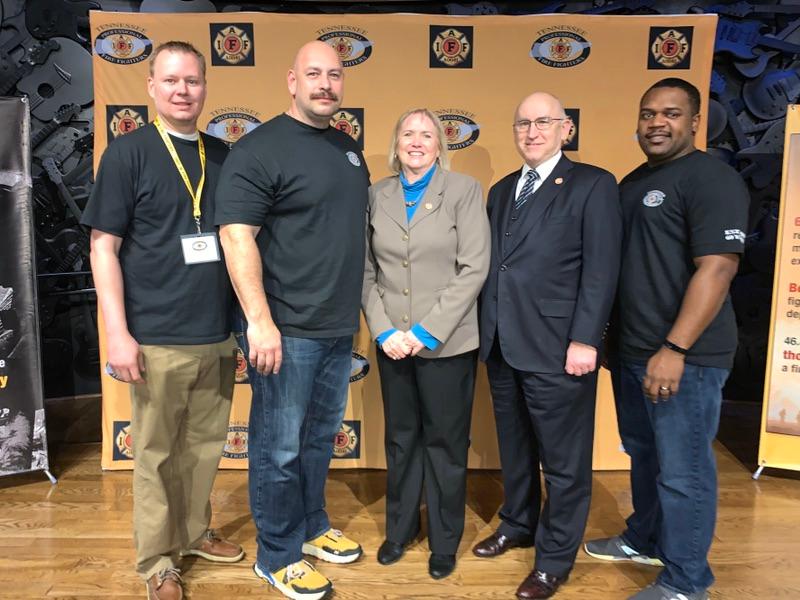
Thankful for the men and women who protect us every day from the Knoxville Fire Department who visited us with their Day on the Hill
Senate Education Committee approves legislation to simplify, modernize and create more opportunities for HOPE Lottery Scholarship recipients
Major legislation simplifying and modernizing the HOPE Lottery Scholarship’s financial aid program, while creating more opportunities for Tennessee students, was approved by the Senate Education Committee this week. Senate Bill 2097 is the most comprehensive financial aid overhaul since the implementation of the HOPE Lottery Scholarship Program in 2003. In addition to helping students achieve their dream of a college education, the overall purpose of the student-focused initiative is to create a highly skilled, credentialed workforce to ensure Tennessee’s economic prosperity and competitiveness.
The legislation makes numerous technical corrections to ensure the program is focused on financial aid and student success including:
· Creating new opportunities to help individuals who are not currently being served well by the program like foster children, homeschoolers, ROTC students, and adult students who do not meet the 25-year-old requirement;
· Establishing one clear definition of scholarship termination at completion of five years or upon receiving a degree;
· Winding down loan programs that are not working or that are supplanted by new programs;
· Only paying for programs within the student’s field of study to keep a focus on timely graduation and costs; and
· Expanding opportunities for soldiers who are not being served by the confines of the state’s Helping Heroes Program established in 2008.
“The General Assembly created a program called Helping Heroes that was drafted at the time for those veterans serving in Iraq and Afghanistan,” said Tennessee Higher Education Commission Director Mike Krause, who testified in favor the legislation. “The theatre of operations has expanded. We would hate to think of the fact that the soldiers who participated in the raid in Syria last fall are not eligible for our scholarship under the current statute.”
The legislation also affects soldiers who enter the armed services after high school and return to complete their degree, but are not eligible because they do not meet the Non-Traditional HOPE Scholarship age requirement of 25 years old. The bill provides that as long as an individual can file financial aid independently, they should be eligible. Krause said the same provision applies to help other Non-Traditional HOPE Scholarship recipients like a 22-year old single mother seeking to gain her college degree but who is currently not eligible because of the age requirement.
The bill now goes to the Senate Finance, Ways and Means Committee for approval before moving to the Senate floor for final consideration.
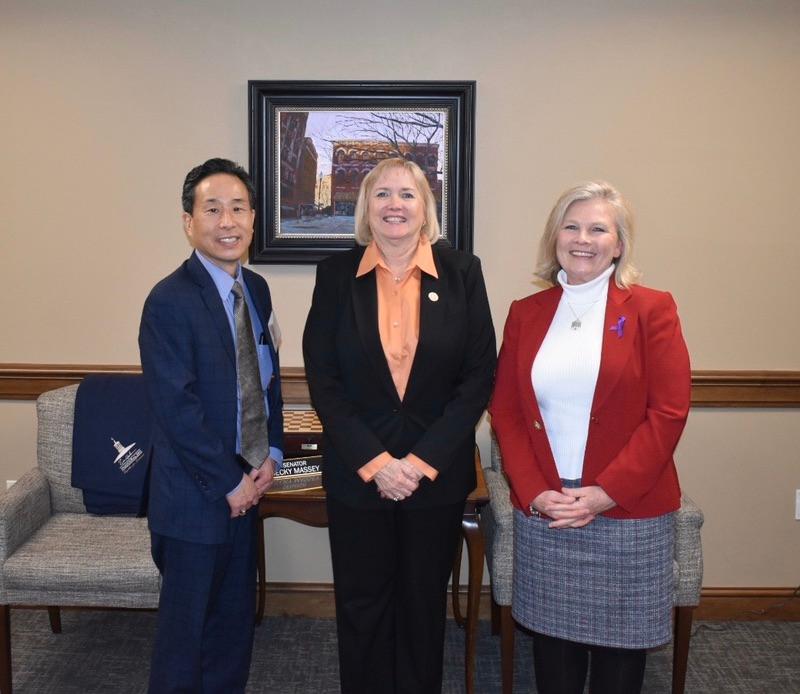
I enjoyed visiting with Knox County District Attorney General Chame Allen and her Chief Deputy District Attorney, Sam Lee
Meth from Mexico is state’s number one illegal drug
according to TBI
In 2019, methamphetamine overcame marijuana to become the number one illegal drug seen by the Tennessee Bureau of Investigation (TBI) according to Director David Rausch who testified before the Senate Judiciary Committee this week. The TBI had over 12,000 submissions of the dangerous drug last year, with the vast majority brought into Tennessee over the U.S. border from Mexico. Rausch said that violent crime could increase due to its popularity and its transformative effects on the brain of users.
“This is a drug that scares me because of what it does to people,” said Rausch. “It is unlike anything we’ve seen before. With the opioid crisis, what we saw is there is a way of rewiring the brain if you can get a person off the drugs. You can’t do that with meth. It will transform the brain and it never goes back. That’s scary because of the psychosis that results from this drug and what we are already seeing in terms of violence, it’s going to increase.”
Rausch complimented lawmakers on the General Assembly’s efforts to rid the state of meth produced in Tennessee. He said the work done to eradicate meth labs from Tennessee has been tremendously successful with almost none of the drug being produced within the state.
“I will tell you that it is coming across the border,” he added. “Our number one effort and concern at this point is the amount of meth that is flowing, and it’s all is coming from Mexico – every bit of it.”
Rausch said that whereas the TBI would previously catch grams or maybe an ounce here or there of meth; now the agency captures much greater quantities measured in pounds. This includes a 94-pound seizure of methamphetamine last week.
In other news on crime in Tennessee, the TBI reports:
· From 2018-2019, group A crimes per 100,000 population, which includes the state’s most violent crimes, are down five percent;
· Overall, arrests per 100,000 population is down six percent;
· Murder has continued a two-year decline, down eight percent in 2018 and another one percent in 2019
· Rape has continued a two-year decline, down 4.7 percent in 2018 and another six percent in 2019; and
· Other violent crimes that have dropped from 2018-2019 are assaults which are down four percent, aggravated assault which is down two percent, and robbery which is down 17 percent.
Legislation incentivizing development of brownfield sites in Tennessee advances through Senate Revenue Subcommittee
Legislation proposed by Governor Bill Lee to incentivize the development of brownfield sites in Tennessee passed its first hurdle in the Revenue Subcommittee this week. Senate Bill 2158 would lower eligibility requirements for brownfield sites that qualify for a franchise and excise tax credit. This move will help rural communities attract new industry and promote the expansion of existing companies.
Brownfield sites are redeveloped land that may be tainted by hazardous materials, pollutants or contaminates. Currently, there are 2,012 brownfield sites across the state. Many properties in Tennessee, which were previously used as gas stations, drycleaners, factories or properties that could have contamination from unknown sources, qualify as brownfields. Cleaning up and reinvesting in these properties increases local tax bases, enables job growth and improves and protects the environment.
Current law provides a 50 percent franchise and excise tax credit on the purchase of brownfield sites for a qualified development project, but the high eligibility requirements to receive the tax credit have almost entirely prevented this incentive from being utilized. The legislation allows projects in Tier 3 and Tier 4, which are the state’s at-risk rural counties, to more frequently utilize the tax credit. This would be done by lowering the required capital investment from $25 million to $5 million; raising the amount of the tax credit from 50 percent to 75 percent; removing the acreage requirement; and allowing the community to begin remediation and pass the credit along to a company later.
The larger “Tier 1 and Tier 2” counties can also benefit from eligibility adjustments by removing the acreage requirement and allowing the community to begin remediation. They can also pass the credit along to a company later.
The bill was approved unanimously and is scheduled to be considered by the Finance, Ways and Means Committee next week.

Johnny Lewis and Mike Kolinsky, E. M Jellinek Center, stopped by for a visit while in Nashville
In other action…
Legislation simplifies admission process to help adult learners seeking higher education degree – The Senate approved legislation last week to help adult learners with an associate’s degree obtain their four-year degree. I was the sponsor of Senate Bill 1641 ensures that a person with an associate’s degree does not have to provide their high school transcript or GED certificate when applying to a higher education institution. Instead, the applicant can provide their associate degree certificate. This legislation seeks to simplify the application process for many adult degree seekers who might no longer have access to their high school transcript.
Robust state revenues continue positive trend — The Department of Finance and Administration has released the state’s latest revenue collections which showed continued good news regarding the strength of Tennessee’s economy. January state tax revenues totaled $1.55 billion, which is $129.4 million more than budgeted and 11.86 percent greater than revenues received in January 2019. The robust sales tax revenues for January represent 34 consecutive months of positive growth and reflect consumer spending in December. The second quarter adjusted growth rate from sales activity was 6.14 percent compared to last year, while corporate tax revenues exceeded expectations for the month by 23.8 percent. The positive growth trend was driven by solid performances in retail and manufacturing sales.
On an accrual basis, January is the sixth month in the 2019-2020 fiscal year. Year-to-date revenues for six months were $480.5 million more than the budgeted estimate. The general fund recorded $398 million in revenues more than estimates, and the four other funds totaled $82.5 million more than year-to-date estimates.
911 Operators / CPR Instructions – Legislation passed the Senate State and Local Government Committee to ensure all 911 operators across the state are prepared to provide CPR instructions to a caller in an emergency situation. Currently, not all counties allow 911 operators to run callers through CPR instructions. Senate Bill 1958 ensures all 911 operators in the state will provide telecommunicator cardiopulmonary resuscitation (T-CPR), as well as receive proper training to administer it. The legislation also includes liability protection for those providing this service. The legislation now moves to the Senate floor for final consideration.
Resolution calls for federal action to secure citizenship for adult adoptees —
Members of the Senate Finance, Ways and Means Committee voted last week to approve a resolution asking Congress and President Trump to enact federal legislation securing the citizenship of internationally adopted adults. This action would prevent the possibility of deportation for adult adoptees due to non-completion of the naturalization process by their adoptive parents while they were children.
The federal Child Citizenship Act of 2000 aimed to protect children adopted internationally by U.S. citizens by granting them citizenship. However, when the act became law, it did not apply to internationally born adoptees over the age of eighteen. As a result, an alarming number of adoptees who were born before February 27, 1982 and raised in the U. S. do not have U.S. citizenship if their parents did not complete necessary processes to provide their adopted children with citizenship. There are an estimated 18,000 Korean American adoptees alone who do not have American citizenship, despite having been legally adopted. Senate Joint Resolution 832 calls for parity so that all children adopted by U.S. citizen parents will have the same rights as children of U.S. citizens.
Legislation advances to modernize Tennessee Courts E-filing System – The Senate Judiciary Committee advanced legislation which seeks to modernize the state’s court filing system. Senate Bill 2630 would allow any court in Tennessee to use an electronic filing (E-filing) system to provide greater efficiencies for litigations filed throughout the state. In 2016, the General Assembly passed a law allowing civil trial courts to use an E-filing system. Following the success of this practice in the civil trial courts, this legislation was proposed to expand the ability to all Tennessee courts.
In similar action, legislation that I sponsored, was passed by the full Senate allowing law enforcement agencies to choose to issue electronic citations for certain misdemeanor criminal offences in lieu of written citations or arrest. Senate Bill 1622 ensures that a paper copy of the citation be given to the cited person and that the court of jurisdiction receives it within three days of the issuance. Electronic citations are a very efficient process used by many agencies statewide.
New grant program now accepting applications to help volunteer fire departments purchase equipment — Applications are now being accepted from volunteer fire departments under a new program established through legislation and passed by the General Assembly last year. The program earmarks $500,000 for the purchase of firefighting equipment by Tennessee’s volunteer fire departments or to help volunteer departments meet local match requirements of federal grants for purchasing equipment. Fire departments must hold a valid recognition from the SFMO and have a staff of at least 51 percent volunteers to apply.
Grant proceeds may be used to purchase equipment to extinguish fires and protect the life of a firefighter, excluding fire trucks or vehicles. The funds will be awarded equally among Tennessee’s Grand Divisions. Applications will be accepted until 5:00 p.m. CT on Friday, March 27, 2020. For a full list of rules and an application, applicants can visit the Department of Commerce and Insurance website.
Senate Judiciary Committee votes to expand Tennessee’s Safe Haven Law — Legislation expanding Tennessee’s Safe Haven Law advanced through the Senate Judiciary Committee allowing mothers to safely and anonymously surrender their unharmed newborns to certain facilities throughout the state without fear of prosecution for abandonment. Senate Bill 2629 would increase the maximum age of an infant that can be surrendered under the Safe Haven Law from 72 hours old to 14 days old.
Tennessee has over 750 facilities where mothers can surrender their children including hospitals, birthing centers, community health clinics, walk-in clinics, EMS facilities, and certain fire stations and police stations. Since the Safe Haven Law was adopted in 2001, over 100 newborns have been surrendered to approved locations in Tennessee. All fifty states have safe haven policies in place, and the time frames to surrender infants across the country range from three days to one year.
Legislation helps hospitals providing “sliding scale” charity care — The Senate Health and Welfare Committee approved legislation last week to create parity for hospitals which provide charity care to patients on a sliding scale. Senate Bill 1888 redefines charity care to align it with Center for Medicare and Medicaid Services (CMS) regulations so hospitals with sliding scale policies are fully recognized when calculating supplemental payments. Sliding scale charity care discounts help limit financial exposure for lower income individuals who are uninsured or underinsured.
State law currently requires hospitals to have in place and publicly post a charity care policy and to report their uncompensated care to the Department of Health. These amounts are used to calculate supplemental payments from CMS to offset the cost of uncompensated care and for justifying incentive payments for hospitals with high volumes of charity care. The legislation is supported by the Tennessee Hospital Association.
Legislation ensures World War II Veterans can have their military service indicated on their driver’s license — Legislation was approved by the full Senate on Thursday to ensure that World War II veterans can have their military service indicated on their driver’s license or photo identification card. Currently, veterans must provide a certified copy of their Department of Defense form 214 (DD 214) showing dates of service and that the applicant received an honorable discharge to receive this acknowledgement. This certification process, however, did not take into consideration World War II veterans whose service pre-dated implementation of the DD 214 paperwork. Senate Bill 1613 corrects this error by allowing honorably discharged veterans whose service pre-dates the form to utilize an AGO Form 53-55 or NAVPERS 553 as documentation for this purpose, continuing the state’s long-held tradition of honoring our veterans.
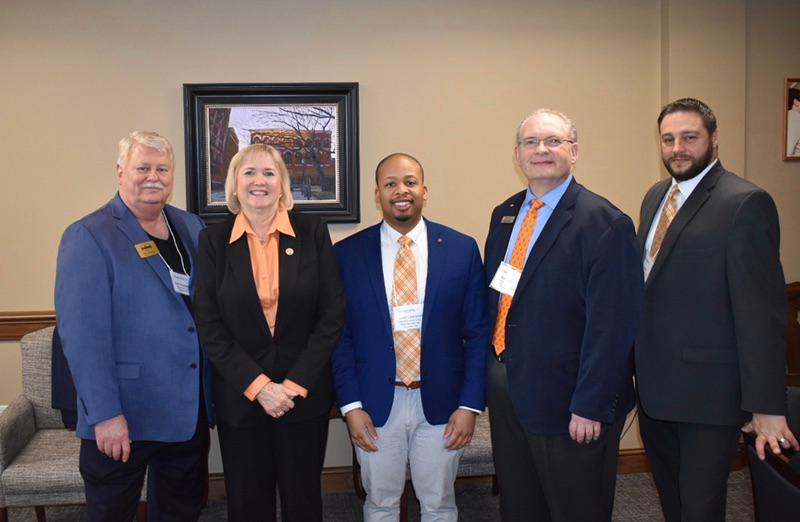
Members of the Greater Knoxville Hospitality Association visited us in Nashville
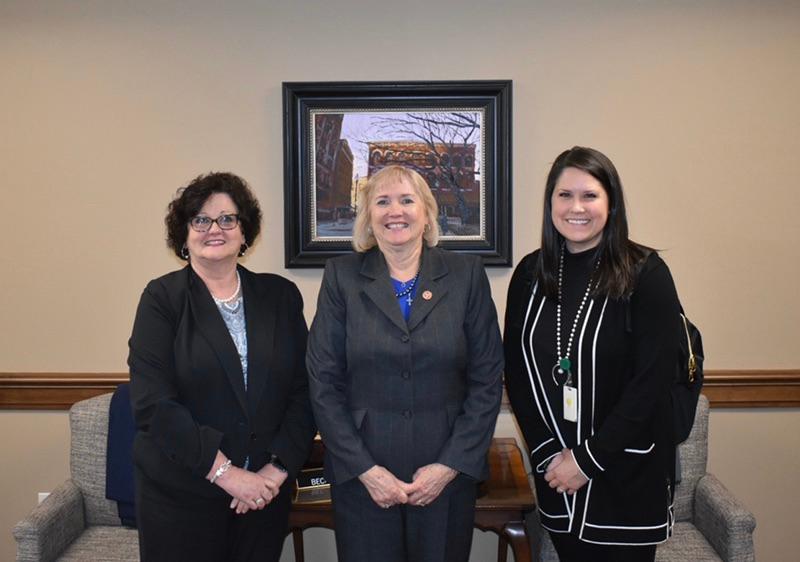
A great meeting with representatives from Florence Crittenton Agency and Helen Ross McNab discussing their work with children and families
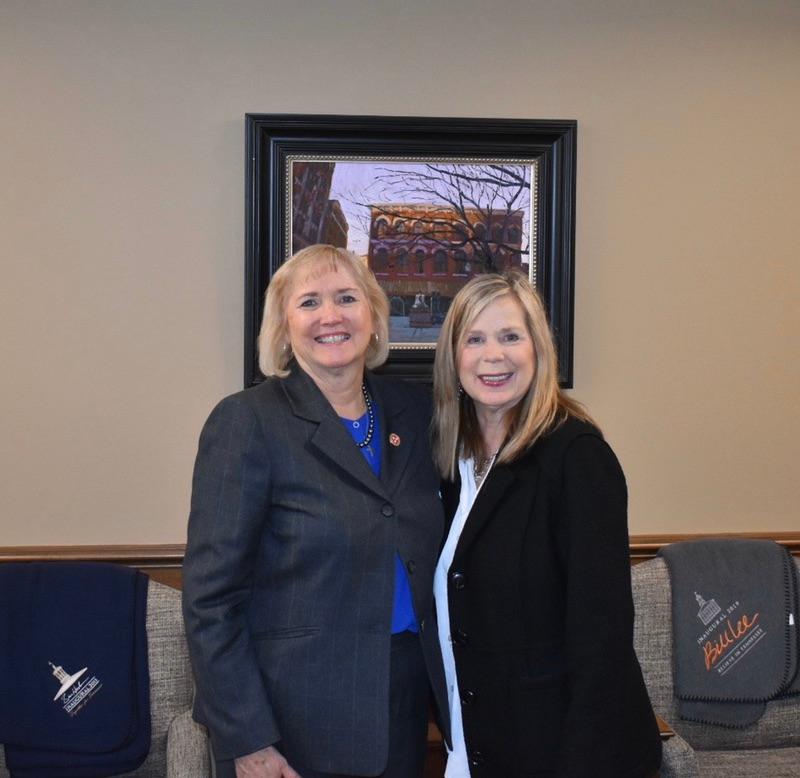
I always enjoy my visits with Debbie Boles and appreciate her passion for public education
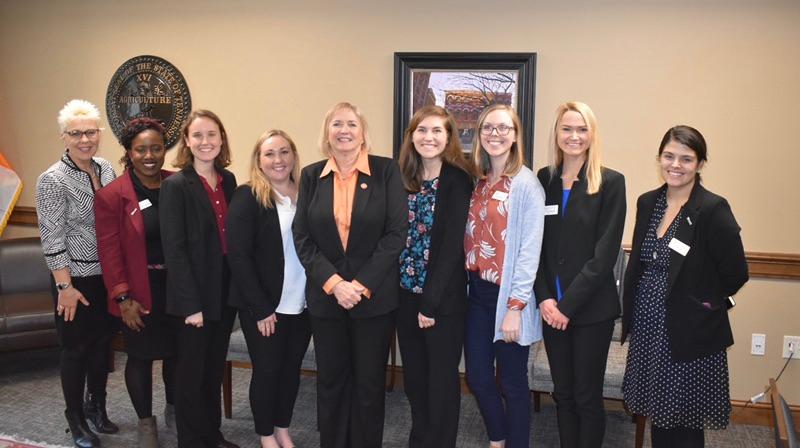
The dietician and nutrition students from UT-Knoxville visited and discussed issues of importance to them
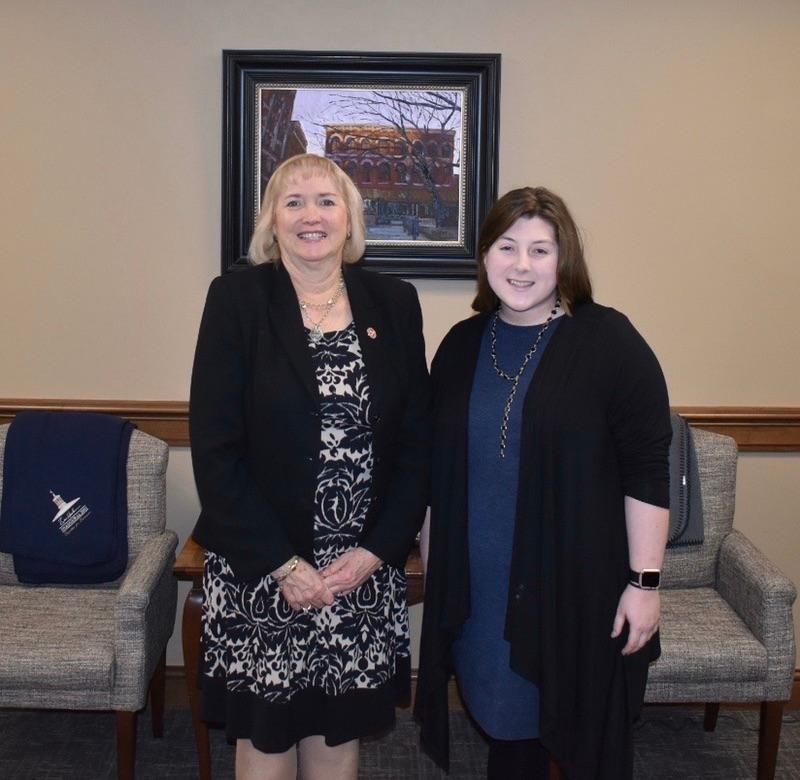
I enjoyed having Emily Skidmore shadow me. Emily is a student at ETSU
For information on State Senators including phone numbers and email addresses, click Tennessee State Senators.
For House members, click Tennessee House Members
For all other information on the General Assembly including legislation, schedules and videos, click Tennessee General Assembly
As always thank you for continued support!
Sincerely,
Becky Massey
District 6 Senator
615-741-1648.
